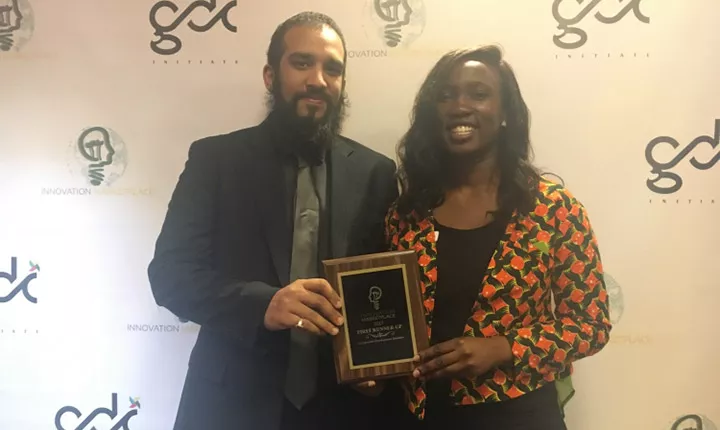Swarthmore Students Find Success with Proposal for Family-Planning Services in Nigeria

Murtaza Khomusi ’17 and Sedinam Worlanyo '17 placed second among 35 teams at the Georgetown Innovation Marketplace Case Competition.
Sedinam Worlanyo '17 and Murtaza Khomusi ’17 recently placed second in the Georgetown Innovation Marketplace Case Competition for their proposal on family planning services in Nigeria.
Worlanyo and Khomusi maintained the College's recent success in the competition, after Swarthmore students finished first among 20 schools last year. Although Khomusi was disappointed to not win, he says that finishing second among 35 schools was gratifying and rewarding, and that “it was really about the process and learning.”
The Georgetown Development Initiative guides the competition, which seeks to empower students to make a great impact on social issues around the world. Each of the 35 teams chose a developing country or area and proposed a program to solve a problem in areas like energy, global healthcare, and the environment in front of judges from the U.S. Department of Treasury, the International Monetary Fund, and the Georgetown Center for Social Impact and Innovation.
Worlanyo and Khomusi — with funding from the Deans Office and support from professors in the Departments of Economics and Peace and Conflicts Studies — were drawn to the issue of family-planning services in Nigeria as both an opportunity to learn about the issue and to affect change.
“I felt like I knew very little about it, which presented a challenge,” says Worlanyo, an economic development and computer science special major from Accra, Ghana, who, along with fellow Lang Opportunity Scholar Bolutife Fakoya ‘17, won last year's student SwatTank competition. "I also knew that Murtaza and I both had unique perspectives that we could bring to brainstorming solutions.”
“I had read some feminist theory in my classes,” adds Khomusi, an Islamic studies special major from East Windsor, N.J., “but I had no idea of what practical steps could be taken to increase awareness and build grassroots movements.”
The title of their proposal, “Naijaceptive,” distills the project’s essence by blending the colloquial terms for Nigeria (Naija) with contraceptive and perspective, says Worlanyo. The team relied on two assumptions: that grassroots movements are the most effective means through which social change is realized, she says, “and that it’s not our job to antagonize the traditional structures of authority.”
“We wanted to work with local constituents and make it a movement about them," adds Khomusi, "led by them and further imagined and shaped by them."
The core philosophy of the project is to promote the use of contraceptives and elevate female status in Nigeria local contexts, with a three-pronged strategy of building community-awareness, designating and training a special task force of religious clergy, and strengthening the communal lending systems of Nigeria.
“It felt amazing to be part of this opportunity,” Worlanyo says of the competition. “From research to crafting a proposal to designing a presentation, each stage felt like a learning experience.”
Khomusi returned to Swarthmore more confident in his abilities to be a practitioner in the future, he adds, and with a new mindset:
“Don’t be afraid to try new things, test out ideas, or try to bridge theory with praxis!"



